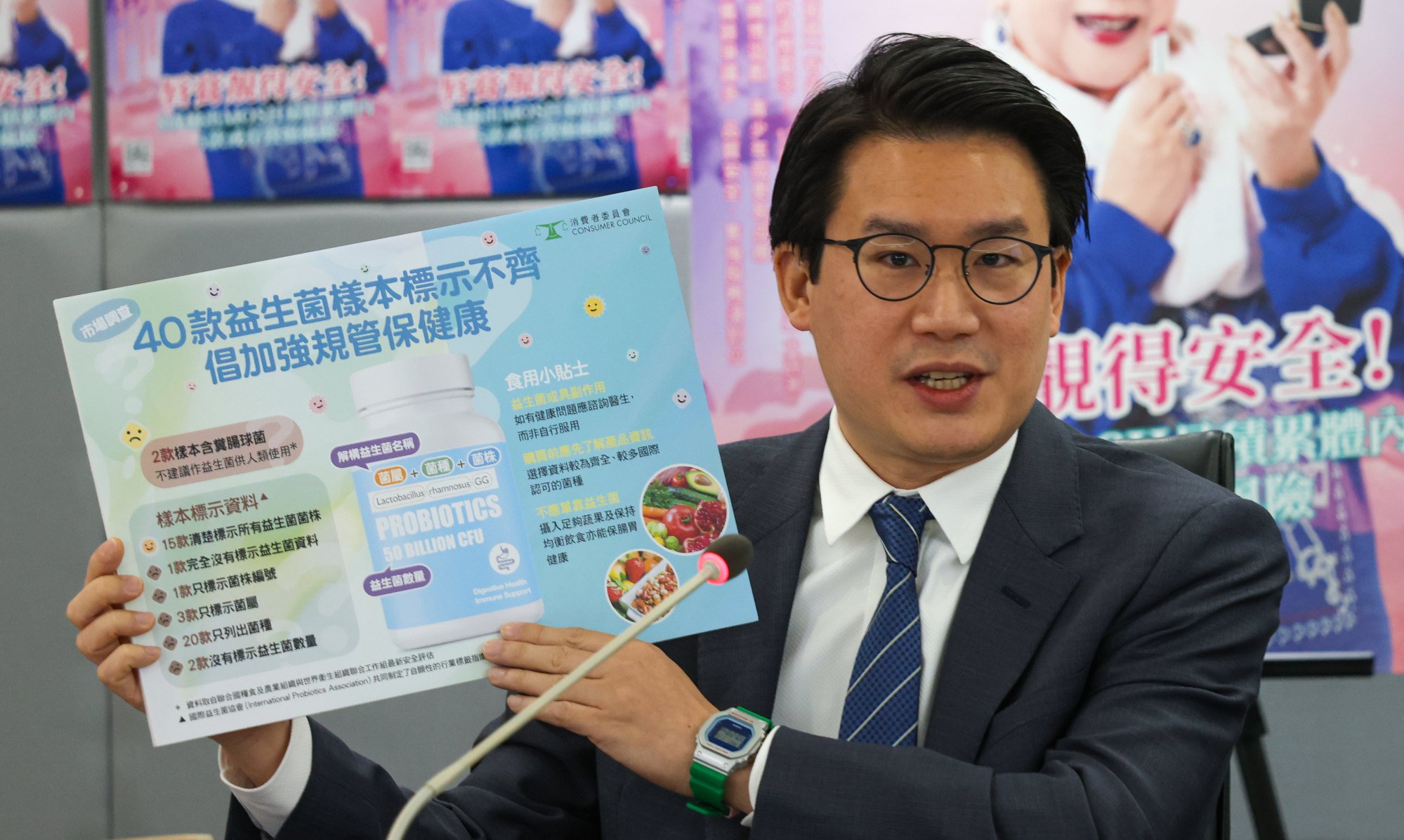
Hong Kong consumer watchdog finds 2 of 40 probiotic products in review contain substances not recommended for humans
- Sixty per cent of reviewed products had no clear labelling about live bacteria they contained
- Only 15 samples had all strains of probiotics clearly printed on packaging, watchdog reveals
Two of 40 probiotic products reviewed by Hong Kong’s consumer watchdog were found to contain substances not recommended for humans and 60 per cent had no clear labelling about the live bacteria they contained.
The Consumer Council on Monday called on the government to come up with standards or legislation for dietary supplements to ensure probiotic products on the market were safe.
Probiotics are microorganisms which can be used to produce dietary supplements designed to be beneficial by improving gut microbiota.
Among the 40 products the council sourced from October to November last year were those from PicoLabb Formulas and Procalun.
They were labelled as containing Enterococcus faecalis – a type of bacteria not recommended for human consumption by a UN joint working group of the Food and Agriculture Organization and the World Health Organization.
The council insisted the bacteria, as well as Enterococcus faecium, were “relatively unstable, easily contaminated or have the risk of turning into pathogens”.
It added the two strains of bacteria could also display resistance to vancomycin, a powerful prescription antibiotic.
Better laws needed to cover simulated gambling games, Hong Kong watchdog says
A spokeswoman for PicoLabb, whose reviewed sample came from the United States, told the Post that a particular Enterococcus faecalis, TH10, was used in the product and added it had been scientifically proven to be beneficial to human health. Reports of safety tests and certifications had also been provided to the council, she added.
The spokeswoman said the council had been “negligent” in making its accusations. She added the company had passed the matter to its lawyers, who would send a legal letter to the watchdog.
ProFone said its Procalun probiotics product was certified safe for human consumption by the Japan Health and Nutrition Food Association.
It added the product contained Enterococcus faecalis strain EC-12, which could help suppress common cold-associated symptoms, as well as improve the intestinal environment, according to past studies.

There are 17 medically recognised probiotic genera in the human body and most medical research focuses on Lactobacillus and Bifidobacterium.
Most samples reviewed by the council were also labelled as containing these two bacteria.
The cost of the tested products ranged from HK$99 (US$12.70) to HK$788, or HK$5.30 to HK$52.60 for a daily serving – a difference of almost nine times.
Hong Kong consumer watchdog says complaints over cosmetic tattoos have doubled
The watchdog also revealed that only 15 of the samples contained all the strains of probiotics listed on the packaging.
Industry voluntary labelling guidelines drawn up by the Canada-based International Probiotics Association said products should clearly label the genus, species and strain of probiotics, as well as their quantities in colony-forming units (CFU).
Among the remaining 25 samples with incomplete information, one was labelled with a number describing the strain, three with the genus only and 20 with the species.
G-NiiB, produced in Italy, had no information about its probiotics and only had “comprehensive probiotics developed by a local university” on its label.
A spokesman for GenieBiome, which owns the G-NiiB brand, said the company complied with the city’s regulatory and food labelling requirements.
“In Hong Kong, it is voluntary to list the species and strains of probiotics,” he said.
He explained that patent application of the probiotics product was in progress, so the company would not disclose its genus, species and strains in Hong Kong.
Hong Kong consumer watchdog slams 4 pharmacies over poor sales practices
All the 40 products examined carried health claims, such as improving gastrointestinal health, boosting immunity and reducing eczema.
But the council said the products might not deliver the results they claimed. Probiotics can improve the flora of the gastrointestinal tract, but the watchdog said consumers who were not healthcare professionals were unable to determine the causes and treatment options for their problems.

The watchdog warned that consumption of the products might have an adverse affect on their condition.
“Research at this stage has not yet confirmed how different probiotic strains help regulate the human immune system,” Victor Lam Hoi-cheung, chairman of the council’s publicity and community relations committee, said.
“Some large-scale clinical trials have found that there is no significant relief in eczema symptoms between patients taking probiotics and those taking placebos.”
Half of the reviewed probiotics products also claimed to be safe for children. One said it was suitable for babies from birth and two others for babies aged at least 6 months.
But the council said that newborn babies should only consume breast milk or infant formula and not any other food, including probiotics.
Metal in your chocolate? Hong Kong consumer watchdog warns of cadmium traces
The United States Food and Drug Administration issued a warning in September last year after a premature baby died of sepsis after consuming a probiotic formula while in hospital.
The council appealed to the government to strengthen regulations for probiotic products.
“The council urges the government to refer to international industry standards or regulations of different jurisdictions and formulate relevant standards or legislation on dietary supplements, ensuring that probiotic products available on the market are safe, with satisfactory ingredients and efficacy to safeguard consumer health,” the watchdog said.

